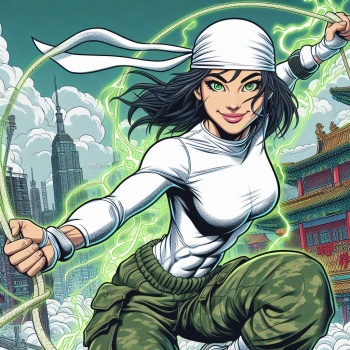Difference between revisions of "Zhaocai Mao"
m |
m |
||
| Line 110: | Line 110: | ||
[[File:Flamingtext com-223228321.png|800px|center|]] | [[File:Flamingtext com-223228321.png|800px|center|]] | ||
| − | [[File:Zhao in action.jpg|350px| | + | [[File:Zhao in action.jpg|350px|left|]] |
Jennifer’s frustration eventually turned into action. The tipping point came when the landlord of her apartment complex announced a steep rent hike, citing “renovations” that never materialized. It was clear the increase was meant to drive out tenants who couldn’t pay, allowing the landlord to sell the building to a developer. | Jennifer’s frustration eventually turned into action. The tipping point came when the landlord of her apartment complex announced a steep rent hike, citing “renovations” that never materialized. It was clear the increase was meant to drive out tenants who couldn’t pay, allowing the landlord to sell the building to a developer. | ||
Revision as of 02:03, 12 December 2024
|
The author of this article has marked this as a creative work, and would prefer that other users not edit it. Please respect this, and unless repairing a typo, spelling, or other minor technical error, think of this page as read-only. |
| Zhaocai Mao☯︎ | ||||||||||||||||||||||||||
| Player: @Dangerclose50 | ||||||||||||||||||||||||||

| ||||||||||||||||||||||||||
| "Zhaocai Mao, ya'll be finna'rememba'that name." | ||||||||||||||||||||||||||
| Character Build | ||||||||||||||||||||||||||
| Class Focus: | Fire Martial Artist Chi Melee Hybrid | |||||||||||||||||||||||||
| Power Level: | 40 | |||||||||||||||||||||||||
| Research & Development: | Mystic | |||||||||||||||||||||||||
| Biographical Data | ||||||||||||||||||||||||||
| Real Name: | Jennifer Cao Mui | |||||||||||||||||||||||||
| Known Aliases: | Zhao Mao | |||||||||||||||||||||||||
| Gender: | Female | |||||||||||||||||||||||||
| Species: | Half Human - Half Yaoguai | |||||||||||||||||||||||||
| Ethnicity: | Chinese-American | |||||||||||||||||||||||||
| Place of Birth: | Westside Detroit | |||||||||||||||||||||||||
| Base of Operations: | Millennium City, Detroit | |||||||||||||||||||||||||
| Relatives: | Luji Mao (Mother) | |||||||||||||||||||||||||
| Characteristics | ||||||||||||||||||||||||||
| Age: | 22 years old | |||||||||||||||||||||||||
| Height: | 5'6 | |||||||||||||||||||||||||
| Weight: | Around 138lbs | |||||||||||||||||||||||||
| Eyes: | Lime Green | |||||||||||||||||||||||||
| Hair: | Black-Red-Blond mix | |||||||||||||||||||||||||
| Complexion: | Light golden tan | |||||||||||||||||||||||||
| Physical Build: | Athletic-Curvy | |||||||||||||||||||||||||
| Physical Features: | Snakebite & Navel piercing | |||||||||||||||||||||||||
| Status | ||||||||||||||||||||||||||
| Alignment: |
Chaotic Good | |||||||||||||||||||||||||
| Reputation: |
Reputable | |||||||||||||||||||||||||
| Identity: | Public | |||||||||||||||||||||||||
| Years Active: | 6 | |||||||||||||||||||||||||
| Citizenship: | Chinese & American Citizenship | |||||||||||||||||||||||||
| Occupation: | Thief & Vigilante | |||||||||||||||||||||||||
| Education: | High School Dropout | |||||||||||||||||||||||||
| Marital Status: | Single | |||||||||||||||||||||||||
| Known Powers and Abilities | ||||||||||||||||||||||||||
| Chi reading, manipulation and conjuring, Luck & Jinx manipulation/Aura. | ||||||||||||||||||||||||||
| Equipment and Paraphernalia | ||||||||||||||||||||||||||
| Varies greatly | ||||||||||||||||||||||||||
| Attributes | ||||||||||||||||||||||||||
| Strength |
|
Endurance |
|
|||||||||||||||||||||||
|---|---|---|---|---|---|---|---|---|---|---|---|---|---|---|---|---|---|---|---|---|---|---|---|---|---|---|
| Agility |
|
Speed |
|
|||||||||||||||||||||||
| Fighting |
|
Projectiles |
|
|||||||||||||||||||||||
| Durability |
|
Resistance |
|
|||||||||||||||||||||||
| Intelligence |
|
Psyche |
|
|||||||||||||||||||||||
| Intuition |
|
Charisma |
|
|||||||||||||||||||||||
| ReldinBox Template | ||||||||||||||||||||||||||
Jennifer Mui grew up in the heart of Chinatown, a neglected corner of Detroit’s Westside. The eldest child of Lu Ji, an immigrant single mother, Jennifer quickly learned the meaning of responsibility. Life was tough, but Lu Ji worked tirelessly to provide for her children, holding down two jobs—waiting tables during the day and cleaning office buildings at night. Though their apartment was cramped and modest, it was filled with love, and Lu Ji always found time to teach Jennifer about their heritage and values, instilling pride in their identity.
When Jennifer was 11, her younger brother Hao was born. His arrival brought both joy and additional challenges. Lu Ji’s already limited resources were stretched even thinner, but Jennifer adored her baby brother and often helped care for him, becoming his second protector.
When Jennifer was 13, tragedy struck. One night, while walking home from the diner after a late shift, Lu Ji was caught in the crossfire of a gang shootout. A stray bullet ended her life, leaving Jennifer and two-year-old Hao orphaned. The police treated the incident as just another statistic, a common occurrence in a neighborhood plagued by violence.
Jennifer was devastated. Her mother had been her rock, and now she was gone. With no extended family to turn to and the foster system looming, Jennifer made a fateful decision: she would keep her family together at all costs. Refusing to let strangers raise her brother, Jennifer dropped out of school and took full responsibility for Hao.
The streets of Chinatown, already unforgiving, became even harsher without Lu Ji’s protection. Jennifer took on whatever jobs she could find to make ends meet, from cleaning homes in wealthier neighborhoods to running deliveries for local shop owners. Some jobs weren’t exactly legal, but Jennifer didn’t have the luxury of being choosy.
By necessity, Jennifer became street-smart and tough. She learned to navigate the gang-dominated landscape, avoiding trouble where she could and standing her ground when she couldn’t. Her focus was singular: keep a roof over Hao’s head, food on the table, and him safe from the dangers that had claimed their mother.
Hao, too young to understand the full weight of their situation, became Jennifer’s anchor. His laughter and curiosity gave her purpose, reminding her of the innocence she was determined to protect.
Jennifer Mui’s frustration with the system began long before her mother’s death but solidified in the aftermath of that tragedy. Chinatown and the surrounding areas of Westside Detroit were often overlooked by both the government and the city’s self-proclaimed protectors. Infrastructure was crumbling, public services were scarce, and law enforcement treated the neighborhood as a no-go zone unless it was to crack down on petty criminals.
As Jennifer grew older, she noticed the glaring disparity between neighborhoods like hers and the wealthier districts of the city. Police cars were a rare sight in Chinatown, but when they did appear, it was to hassle small shop owners, detain loitering teens, or perform perfunctory sweeps that did nothing to address the deep-rooted issues. The gang leaders and slumlords who profited off the community’s despair operated with near impunity, their wealth shielding them from meaningful consequences.
Jennifer’s anger only simmered when her mother, Lu Ji, was killed. The police investigation was perfunctory at best. Officers arrived hours after the incident, treating Lu Ji’s death as just another statistic in a long list of unsolved murders. They didn’t interview witnesses, didn’t follow leads, and seemed more concerned with filing paperwork than finding justice. When Jennifer tried to press for answers, she was met with condescension and thinly veiled dismissal.
“You people need to handle your own problems,” one officer had said, words that stayed with Jennifer for years.
Jennifer’s disillusionment wasn’t limited to law enforcement. As she grew older, she became increasingly skeptical of the so-called “heroes” who graced the city. Caped vigilantes and superpowered champions made headlines when they thwarted world-ending threats or brought down flashy villains in wealthy districts. But in Chinatown, their presence was almost nonexistent.
Her bitterness toward these “sellout capes” grew from witnessing their selective heroism. They swooped in to save the day when cameras were rolling, but when it came to addressing systemic issues like poverty, gang violence, and exploitation in neighborhoods like hers, they were nowhere to be found. Jennifer couldn’t help but wonder if their priorities were driven more by public relations than a genuine desire to help.
When she was 15, a highly publicized hero coalition launched an initiative to “clean up” Detroit. For weeks, news outlets broadcast stories about crime being driven down in affluent areas, thanks to the heroes’ intervention. Meanwhile, Chinatown and other impoverished neighborhoods bore the brunt of the crime displaced from those “cleaned-up” areas. Jennifer watched as violence escalated in her community while the heroes declared victory and moved on to their next high-profile mission.
Her disillusionment turned into outright disdain. To Jennifer, the capes were no better than the corrupt politicians and landlords who exploited her people—they just wore brighter colors.
Jennifer’s anger at the system deepened as she navigated the challenges of raising her younger brother Hao after their mother’s death. With no extended family to help, she was thrust into the role of parent and provider. Social services were quick to intervene when they thought Jennifer was incapable of caring for Hao but were unresponsive when she reached out for genuine help.
At one point, Jennifer attempted to enroll Hao in a better school outside of Chinatown, hoping to give him a chance at a brighter future. The application was rejected because she couldn’t provide proof of income, a requirement that seemed designed to keep families like hers trapped in cycles of poverty.
Her bitterness toward the system reached a boiling point when a local gang leader extorted the tenants of her apartment complex, including her. The landlord, well aware of the gang’s activities, did nothing to stop it. Jennifer contacted the police, hoping for intervention, but they never showed up. She realized that the law only seemed to work for those who could afford its protection.
By the time Jennifer was 16, she understood the unspoken rules of the system: the rich and powerful thrived at the expense of the poor, and the institutions that were supposed to serve the people were complicit. Police officers were more interested in shaking down small-time offenders than confronting the heavily armed gangs. Politicians made empty promises during election seasons and disappeared when it came time to deliver. Even the heroes, who claimed to fight for justice, were part of the problem, ignoring the struggles of those who lived in the shadows of their skyscrapers.
This realization left Jennifer with a seething hatred for the inequities around her. She began to see the world as a rigged game, one where people like her and Hao were destined to lose unless they made their own rules.
Jennifer’s frustration eventually turned into action. The tipping point came when the landlord of her apartment complex announced a steep rent hike, citing “renovations” that never materialized. It was clear the increase was meant to drive out tenants who couldn’t pay, allowing the landlord to sell the building to a developer.
Furious and desperate to keep a roof over her brother’s head, Jennifer decided to take matters into her own hands. She broke into the landlord’s office one night, finding not only cash but documents revealing his collusion with gangs to intimidate tenants. Jennifer took what she needed and anonymously leaked the incriminating documents to a local activist group.
Though it was a small victory, it sparked something in her. She realized that the system could be subverted and that she had the skills and determination to do it. If no one else would fight for her community, she would, marking the beginning of Jennifer's transition into Zhaocai Mao.
Jennifer Mui’s transition into becoming Zhaocai Mao began as a slow burn fueled by necessity, anger, and an innate sense of justice twisted by her environment. At first, her actions were small and personal—breaking into local gang hideouts to retrieve money stolen from struggling shop owners or intercepting shipments of stolen goods to return them to their rightful owners. Her goal wasn’t to become a hero but to address the immediate needs of her community.
Her first major heist was almost accidental. While frequenting one of her favorite noodle shops, Jennifer overheard a conversation between a corrupt local city councilman and a gang leader. They were discussing a payoff involving a substantial amount of cash stashed in a nearby safe house. Struggling to pay rent and feed Hao, Jennifer decided to take a chance.
Armed with nothing but a crowbar and a bandana tied over her face, Jennifer broke into the safe house late at night. The job was sloppy, almost amateurish, she nearly tripped the alarm and barely managed to sneak past the one guard stationed inside. But she got what she came for: $15,000 in untraceable bills. She left $10,000 on the doorstep of a struggling family in her apartment complex, paid her rent for the next six months with the rest, and never looked back.
Another of Jennifer’s early missions as Zhaocai Mao solidified her role as Chinatown’s unspoken defender. A local charity, which operated a food bank and community center, was targeted by a gang demanding protection money. When the charity couldn’t pay, the gang retaliated by trashing the center and threatening to burn it down.
Jennifer decided to send a message. She staked out the gang’s headquarters for days, learning their schedules and routines. On the night of her plan, she broke into the building, dismantled their surveillance system, and sabotaged their stash of weapons. She even left a threatening message carved into the gang leader’s desk, warning them to stay out of Chinatown.
But Jennifer wasn’t satisfied with scaring them off. She found their safe, loaded with cash from their extortion rackets, and took everything. The next day, she anonymously donated the money to the charity, allowing them to repair the damage and continue their work.






